Retail is no longer operating in cycles; it’s operating in moments. Every second brings a new signal: a shift in demand, a drop in inventory, a customer expecting relevance right now. In fact, 73% of consumers say they expect brands to understand their unique needs and expectations in real time. But the pace of modern retail has outgrown traditional playbooks, and with it, the systems built to manage it are showing their age.
Today’s leaders face a different reality: fragmented data, shrinking margins, unpredictable supply chains, and a workforce stretched thin. The need is no longer just automation; it’s intelligence that can act. Systems that adapt in real time, not just execute static rules.
This is where AI agents come in. Think of them not as bots, but as intelligent digital collaborators capable of perceiving context, supporting decision-making, learning from outcomes, and acting autonomously. Whether it’s adjusting pricing on the fly, supporting associates in-store, tailoring experiences mid-journey, or rebalancing inventory based on local demand, AI agents don’t just automate tasks; they help solve problems dynamically.
In this blog, we’ll unpack what AI agents are, how they’re already transforming retail operations, and what it takes to harness them effectively. Through strategic insight and real-world use cases, you’ll discover how to lead the shift from static automation to dynamic autonomy. In today’s retail world, it’s not about scaling what worked yesterday; it’s about building what works next.
Understanding AI agents in the retail context
Modern retail demands faster execution, leaner teams, and smarter operations. AI agent development is emerging as an essential digital enabler, automating manual, repetitive, and rules-based tasks that once consumed valuable time across stores, warehouses, and service channels.
Their real value lies in how seamlessly they integrate with staff workflows and existing systems, enabling teams to get more done with greater consistency and less overhead. To see how they fit into this evolving landscape, let’s begin by defining what an AI agent actually is in the retail context.
What exactly is an AI agent in retail
An AI agent in retail is an intelligent automation program designed to perform structured, repetitive, and rule-based tasks across retail operations without constant human supervision. It processes real-time inputs, follows decision logic, and acts in dynamic environments like digital storefronts, supply chains, or customer service workflows.
Unlike traditional programs that rely solely on fixed rules, AI agents may leverage techniques such as machine learning, natural language processing, or decision optimization to respond more intelligently to changes in data, customer context, or business goals.
In a retail environment, these agents can handle up to 90% of manual, low-complexity tasks, including tagging products, updating prices, personalizing recommendations, and responding to FAQs, freeing up your workforce to focus on tasks that require human judgment, empathy, or strategic thinking.
They operate as embedded collaborators across systems from websites and mobile apps to inventory platforms and CRM tools, continuously driving precision, responsiveness, and consistency. What sets them apart is their ability to act persistently, retain task memory across interactions, and align actions with retail objectives like increasing conversions, reducing churn, or streamlining operations.
AI agents vs. traditional models: What’s the real shift
Traditional AI models operate in predefined cycles: data is collected, models are trained offline, and decisions are surfaced periodically. AI agents break that cycle. They’re dynamic, autonomous systems that sense, decide, and act in real time, continuously learning from interactions across channels.
While legacy models rely on static insights, AI agents adapt on the fly, embedded directly into retail workflows like pricing, personalization, and supply chain orchestration. This shift marks a transition from predictive models to intelligent systems that respond to context, not just data. It’s not just an upgrade, it’s a transformation in how retail decisions are made, scaled, and optimized.
Beyond chatbots: What truly sets retail AI agents apart
Retail AI agents go far beyond scripted chatbots or task-specific automation. While chatbots operate within fixed parameters responding to predefined queries, AI agents exhibit goal-oriented autonomy. They don’t just react; they interpret intent, retain context across interactions, and make decisions that align with broader retail objectives.
Whether adjusting inventory in real time or optimizing promotions based on shopper behavior, agents engage in multi-turn reasoning and dynamic adaptation. This shift from static automation to intelligent orchestration is what distinguishes agents, they are not tools waiting for input, but systems acting on behalf of the enterprise, learning and improving continuously at scale.
Types of AI agents shaping the retail landscape
Retail is being redefined by a new class of intelligent systems that go far beyond simple automation. AI agents are no longer confined to chat interfaces, they now play critical roles across merchandising, operations, customer experience, and fulfillment.
Each type of AI agent brings distinct capabilities to the table, shaped by the level of autonomy, domain specialization, and real-time decision-making they offer. Here's how they’re shaping the next frontier of intelligent retail.
1. Reactive AI agents
These are foundational systems that operate on predefined rules and structured prompts. Often used in basic chatbots or voice bots, reactive agents handle high-volume, repetitive tasks such as answering FAQs, tracking orders, or checking inventory. While they offer consistency, their scope is limited to predetermined scenarios with minimal adaptability or learning capabilities.
2. Context-aware and proactive AI agents
Unlike reactive agents, these systems interpret real-time signals behavioral data, purchase patterns, or environmental inputs to anticipate customer intent. They proactively surface product recommendations, trigger personalized promotions, or reroute customer queries to the most relevant resolution path. These agents are built for adaptability, enabling dynamic engagement that aligns with shifting consumer expectations.
3. Cognitive AI agents
Cognitive agents leverage advanced techniques in natural language processing, computer vision, and machine learning to engage with customers more intelligently. These agents act like virtual personal shoppers analyzing individual preferences, contextual behavior, sentiment, and even visual cues to deliver curated, emotionally resonant experiences. They continuously learn and evolve with every interaction, powering hyper-personalization at scale.
4. Collaborative AI agents
These agents operate across enterprise functions marketing, supply chain, customer service and collaborate with each other to align decisions with broader business objectives. For example, a promotion optimization agent may coordinate with an inventory agent to avoid over-discounting on low-stock items. Their strength lies in system-level orchestration, enabling end-to-end optimization across interconnected retail workflows.
5. Autonomous goal-seeking agents
At the frontier of innovation are AI agents that operate independently based on enterprise goals. Rather than waiting for human instructions, these agents pursue outcomes such as increasing customer lifetime value, reducing return rates, or maximizing fulfillment efficiency. They simulate trade-offs, run what-if analyses, and take real-time actions making them invaluable for data-driven decision orchestration in complex retail ecosystems.
Why the retail industry needs AI agents now
The retail landscape is under intense pressure from all sides, with demand volatility, rising costs, labor shortages, and shifting consumer expectations. AI agents are not just another tool; they are fast becoming the operating layer for modern retail, enabling businesses to anticipate, act, and adapt in real time. Here's why retailers can no longer afford to wait.
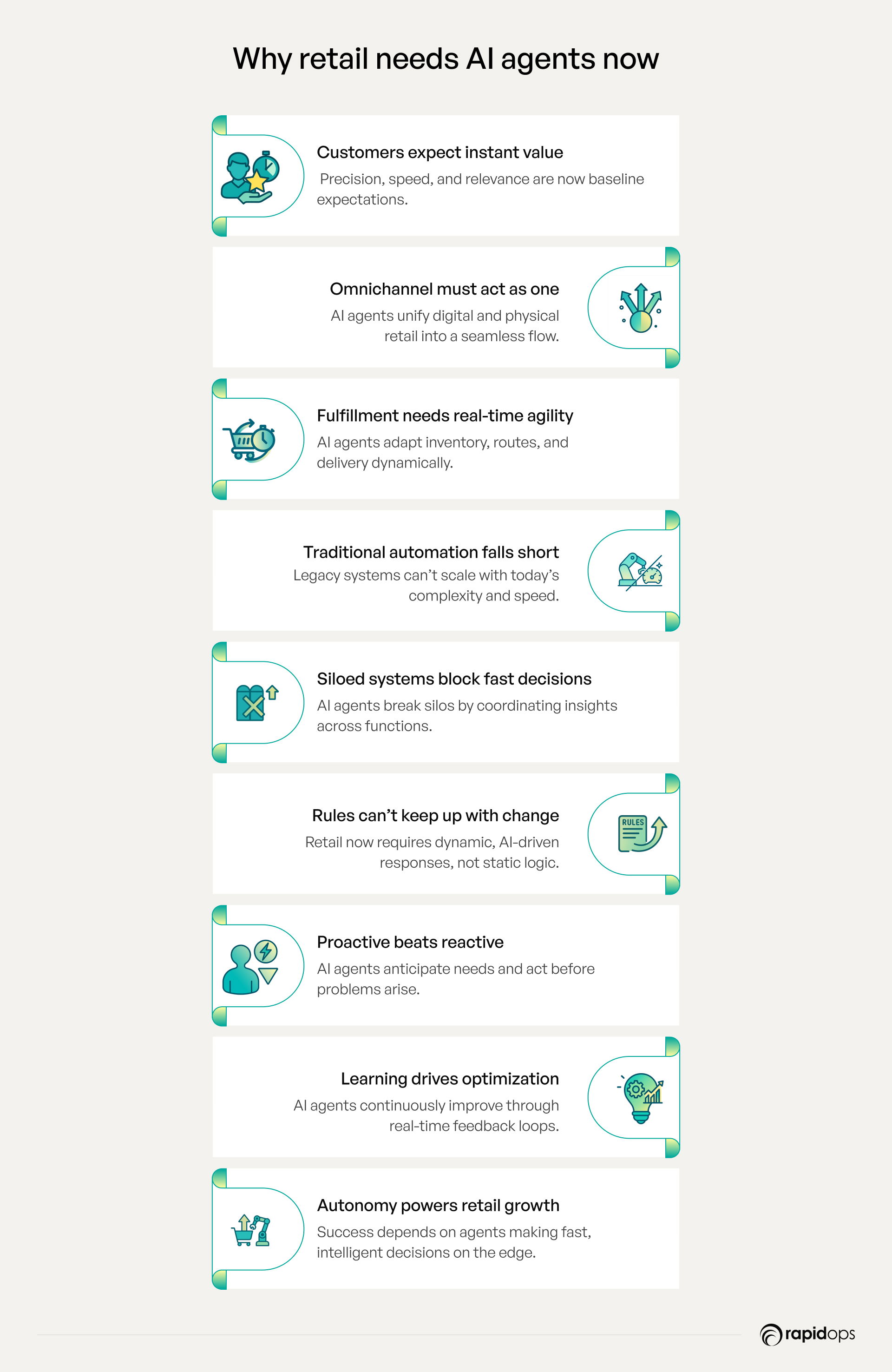
1. Customers demand precision and immediacy
Today’s shoppers expect instant, tailored experiences whether they’re browsing online, engaging in-store, or interacting via chat. AI agents respond in real time, using contextual awareness and predictive intelligence to anticipate needs, resolve inquiries, and personalize journeys at scale.
2. Omnichannel must operate as a unified system
Today's buyers seamlessly move between devices and touchpoints, yet 54% of retailers still struggle with siloed channel operations (McKinsey, 2025). AI agents bridge these divides, syncing product discovery, engagement, fulfillment, and support to deliver a consistent, unified brand experience across digital and physical fronts.
3. Fulfillment needs real-time adaptability
Same-day delivery is now expected in over 40% of urban markets (Statista, 2025). AI agents monitor inventory, customer location, order volumes, and logistics constraints in real time, adjusting fulfillment paths dynamically to optimize for speed, cost, and customer satisfaction.
4. Traditional automation can't scale fast enough
Retail automation is often hard-coded and brittle, failing when customer behavior shifts or data patterns evolve. AI agents are different. They learn from new inputs, adapt decision logic autonomously, and handle complex workflows at scale. This scalability is critical in peak seasons when traffic and order volumes surge up to 300%.
5. Siloed systems slow down decisions
Data trapped in disconnected tools delays insight and execution. AI agents act as connective tissue pulling from POS, CRM, supply chain, and marketing systems to provide a real-time, 360° operational view. This enables faster decisions, reduced inefficiencies, and more agile execution across the enterprise.
6. Static rules miss dynamic retail needs
Retail is no longer rule-based; it's pattern-driven. Traditional logic often fails during promotional bursts, regional surges, or global disruptions. AI agents respond dynamically to evolving trends, using real-time inputs to adjust pricing, allocation, and recommendations, ensuring the brand stays relevant under changing conditions.
7. Intelligence must be proactive, not reactive
Every second of delay costs. According to Bain, proactive issue resolution using AI reduces customer complaints by up to 30%. AI agents preemptively detect anomalies, such as inventory mismatches or rising churn risk, and initiate corrective action before these issues impact customers or revenue.
8. Learning systems drive continuous optimization
The retail environment is too dynamic for static playbooks. AI agents improve through reinforcement learning using feedback loops to fine-tune recommendations, customer journeys, and operational decisions. Retailers who deploy learning agents see up to 25% higher conversion rates and 20% better retention (BCG, 2025).
9. Retail success now depends on autonomous action
AI agents are not just augmenting human teams; they are evolving into autonomous actors across merchandising, marketing, support, and logistics. Leading retailers, such as Walmart and Carrefour, are already deploying AI agents for predictive ordering and store-level decision-making, reducing stockouts by 30% and improving shelf availability by 20%.
The business value AI agents deliver to retailers
Retailers are moving beyond task automation toward intelligence-driven transformation. AI agents, autonomous systems trained to perceive, reason, and act within business contexts, are becoming instrumental in delivering measurable, enterprise-wide value. Here’s how they’re driving impact across key dimensions of retail performance.
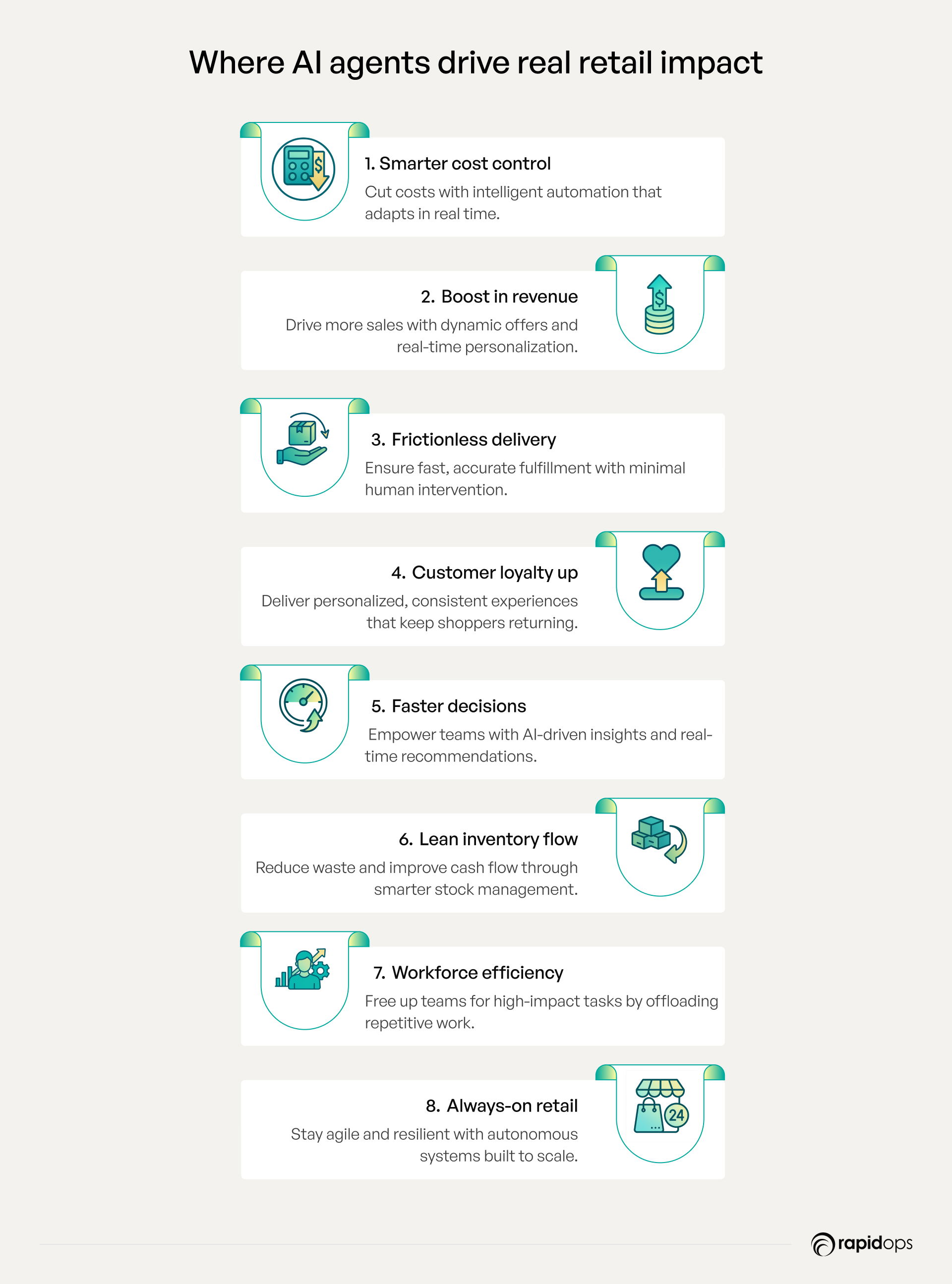
1. Cost efficiency through intelligent automation
AI agents minimize manual interventions across repetitive, high-volume processes like returns management, pricing updates, and product tagging. Unlike rule-based RPA, they continuously adapt to new workflows and exceptions, reducing operational overhead while improving accuracy. This helps retailers lower costs without compromising service levels.
2. Revenue uplift via real-time personalization and dynamic offers
AI agents ingest behavioral, transactional, and contextual signals to tailor product recommendations, promotions, and content in real time. This enables more relevant cross-sell, upsell, and bundling opportunities across digital and in-store channels. Retailers deploying real-time AI personalization have seen revenue per visitor increase by 10–20%, according to McKinsey.
3. Faster, error-free fulfillment at scale
From predictive routing to autonomous exception handling, AI agents orchestrate fulfillment operations with precision and real-time accuracy. They factor in inventory status, logistics constraints, and service-level commitments to reduce delivery errors and missed SLAs, especially during peak demand windows when traditional systems fall short.
4. Improved customer satisfaction and retention
AI agents proactively monitor customer sentiment, preferences, and journey friction points, escalating issues, resolving queries, and fine-tuning experiences autonomously. This results in higher satisfaction scores, reduced churn, and increased customer lifetime value. Brands using conversational AI experience a 30% reduction in support response times.
5. Accelerated decision-making and operational agility
AI agents enhance operational agility by analyzing real-time data and suggesting optimal actions across pricing, inventory, and promotions. While they don't independently make decisions, they support retail teams with timely insights and automation, enabling faster, smarter responses without replacing human judgment or oversight.
6. Reduced inventory waste and improved cash flow
By dynamically aligning stock levels to real-time demand signals, AI agents reduce overstocking and understocking. This minimizes markdown losses, frees up working capital, and improves gross margins. Leading retailers leveraging AI for demand sensing have cut inventory holding costs by up to 15%.
7. Greater workforce productivity
AI agents augment retail associates and HQ teams by offloading repetitive tasks, freeing human talent to focus on value-adding activities like customer engagement, merchandising strategy, or supplier negotiations. This improves employee satisfaction and drives better business outcomes with fewer resources.
8. Increased resilience and business continuity
Whether navigating supply chain shocks or sudden demand spikes, AI agents help retailers stay adaptive. They monitor system-wide signals for anomalies, reroute decisions instantly, and enable continuity across core functions, keeping operations steady when disruptions occur.
9. Scalable innovation across retail touchpoints
AI agents don’t just optimize, they enable innovation. From interactive in-store assistants to AI-powered trend forecasting, they help retailers experiment with new formats and customer experiences. And because they learn autonomously, these innovations scale quickly across stores, regions, and digital properties.
High-impact use cases across the retail value chain
AI agents are redefining value creation at every stage of the retail lifecycle, from customer engagement to operations. Below are key use cases where intelligent agents solve real challenges, deliver transformation, and create measurable business impact.
1. Hyper-personalized shopping journeys (web, app, in-store)
Retailers often face fragmented experiences across channels, leading to customer drop-offs and generic recommendations. AI agents solve this by unifying behavioral data, preferences, real-time context, and location signals to deliver 1:1 personalized journeys, be it product suggestions on a website, contextual nudges in an app, or in-store promotions via digital screens. These agents adapt continuously, learning with every interaction to remain relevant across moments and touchpoints. As a result, retailers see higher engagement, reduced bounce rates, and an average of 10–20% increase in conversion rates and customer lifetime value through seamless, intelligence-driven experiences.
2. Proactive customer service through intelligent agents
Most customer service systems react after problems arise, often leading to long wait times and inconsistent support. AI agents enable proactive, contextual service by detecting potential issues, understanding sentiment, and accessing customer history across channels in real time. They deflect common queries, recommend resolutions instantly, and escalate issues only when necessary, creating a seamless support layer. This transformation leads to faster response times, lower operational costs, and improved customer satisfaction scores, with enterprises reporting up to 30% reduction in ticket volume and 25% faster resolution compared to traditional models.
3. Dynamic pricing based on live demand signals
Static pricing models often lag shifting market conditions, leaving margins on the table or causing customer churn. AI agents revolutionize pricing by ingesting demand trends, competitor movements, seasonality, and customer behavior to adjust prices in real time across SKUs and channels. These systems optimize for both profitability and competitiveness, ensuring prices stay responsive and aligned with business goals. Retailers adopting dynamic pricing agents report 5–10% higher margins, improved sell-through rates, and greater pricing agility across campaigns and inventory cycles without manual intervention.
4. Autonomous supply chain and replenishment coordination
Retail supply chains often suffer from manual forecasting, delayed visibility, and misaligned inventory flows. AI agents change this by analyzing real-time sales velocity, regional demand signals, lead times, and supplier data to automate replenishment and inventory orchestration. They proactively mitigate stockouts, reduce overstocking, and adjust plans as disruptions arise. This shift from reactive to predictive coordination leads to more resilient operations, with retailers achieving 25–40% improvement in inventory turns, fewer fulfillment delays, and reduced carrying costs, all while enhancing service levels to stores and customers.
5. Smart bundling and cross-sell recommendations
Traditional bundling strategies tend to be rule-based and overlook evolving customer intent, resulting in low uptake. AI agents intelligently learn from purchase history, contextual data, and product affinities to create real-time, personalized bundle suggestions. Whether during checkout or across marketing channels, these agents present combinations that reflect what individual customers are most likely to buy next. This transformation enhances both discovery and value perception, lifting average order values by up to 35%, while reducing abandoned carts and increasing the overall success rate of cross-sell and upsell initiatives.
6. Fraud detection in transactions and returns
Retailers face growing fraud risks, including transaction fraud and abuse of return policies, often beyond the detection capacity of rule-based systems. AI agents use pattern recognition, device fingerprinting, user behavior analysis, and historical data to detect fraud in real time, flag anomalies, and prevent loss before it occurs. Unlike rigid models, these agents evolve as fraud patterns change, enabling adaptive defense. This intelligent shift reduces false positives while protecting legitimate customers, helping retailers decrease chargeback losses by up to 40% and return fraud incidents by over 25%, without degrading customer experience.
7. Agent-powered loyalty and retention strategies
Loyalty programs often fail to drive repeat behavior when rewards are generic or misaligned with customer expectations. AI agents elevate loyalty by continuously analyzing customer segments, behaviors, spend patterns, and churn risk to deliver hyper-targeted incentives, retention nudges, and win-back offers. These interventions are personalized and timed to maximize their impact, whether via email, app push notifications, or in-store prompts. This reimagined engagement drives meaningful interactions, boosting repeat purchases and customer lifetime value. Enterprises using agent-driven loyalty models have reported up to an 18% increase in retention and a deeper emotional brand connection.
8. Workforce task automation and co-piloting
Retail employees spend significant time on repetitive tasks like restocking, answering FAQs, or managing schedules, limiting time for value-driven work. AI agents augment staff by automating routine workflows and acting as digital co-pilots, offering real-time task suggestions, operational insights, and decision support. Store associates gain instant access to product info, process guidance, or inventory status, boosting efficiency and accuracy. Managers benefit from automated workforce planning and analytics. This transformation enables up to 30% improvement in operational productivity, reduced training overhead, and higher employee satisfaction by empowering frontline teams with intelligent tools.
100 proven AI agent use cases delivering immediate impact, without the need for massive technology overhauls!
Download Now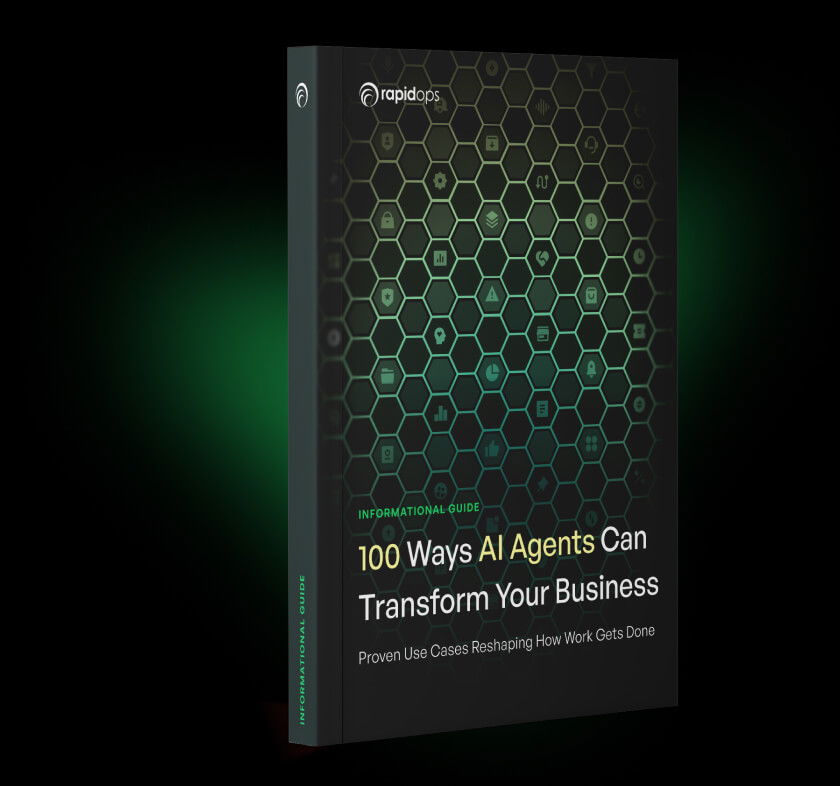
What do you need in place to adopt AI agents successfully
Adopting AI agents in retail isn’t a matter of plugging in a new tool; it’s an enterprise-level transformation that touches strategy, systems, data, governance, and people. To realize their full value, organizations must prepare across multiple dimensions, ensuring every foundational layer is aligned and future-ready. Below are the seven core pillars to enable the successful deployment and scale of AI agents in retail.
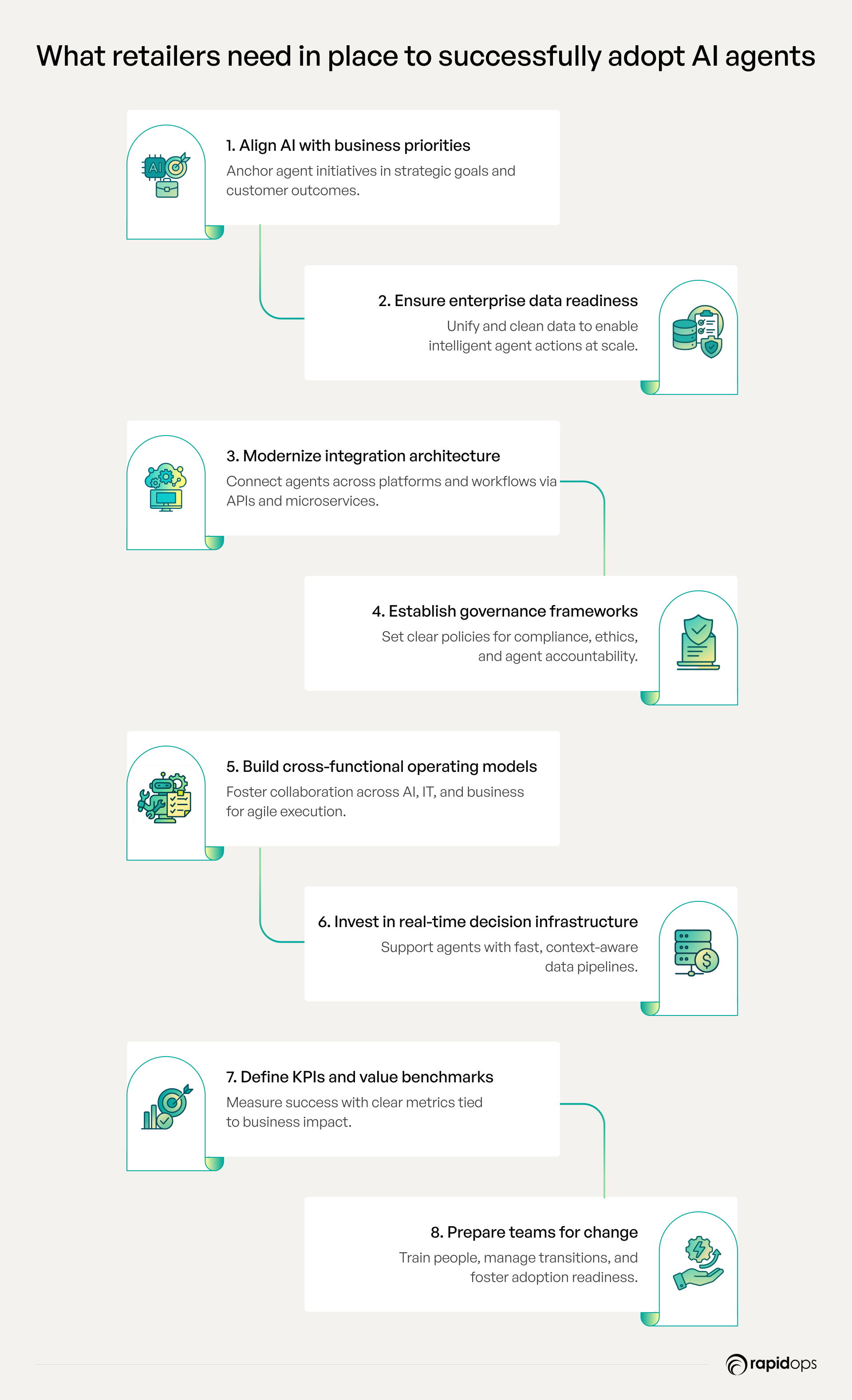
Align AI with business priorities
AI agents must be anchored to clearly defined business goals, whether it's enhancing customer experience, reducing operational cost, or accelerating time-to-value. Start by identifying high-impact workflows where autonomy and intelligence can drive measurable outcomes. Strategic alignment ensures that AI isn’t treated as a siloed initiative, but as a direct enabler of top-line and bottom-line growth.
Ensure enterprise data readiness
AI agents thrive on high-quality, real-time data. That means unifying fragmented datasets across commerce, CRM, ERP, and supply chain systems; resolving identity across touchpoints; and establishing continuous data pipelines. Data quality, accessibility, and governance are non-negotiable to ensure agents respond with relevance, precision, and context at scale.
Modernize integration architecture
For AI agents to operate effectively across digital, physical, and operational environments, they must be tightly integrated into the enterprise stack. This includes API orchestration, event-driven architectures, and composable platforms that allow agents to interact with systems in real time. Without seamless AI integration, agents remain disconnected and fail to deliver impact.
Establish governance frameworks
AI agents introduce new layers of autonomy demanding robust governance. Enterprises need to define oversight structures that address model explainability, decision traceability, ethical boundaries, and regulatory compliance. Governance must evolve from traditional IT controls to include AI-specific policies that manage risk without stifling innovation.
Build cross-functional operating models.
AI agent success depends on collaboration. IT, data science, product, operations, and line-of-business teams must co-own the roadmap, use case pipeline, and ongoing refinement. Establishing agile pods or centers of excellence with clear accountability bridges the gap between experimentation and scalable value delivery.
Invest in real-time decision infrastructure.
AI agents require continuous, low-latency access to events, customer signals, inventory shifts, and environmental changes to make accurate decisions. This demands investment in streaming data infrastructure, cloud-native pipelines, and edge processing capabilities, enabling agents to adapt in the moment, not after the fact.
Define clear KPIs and value benchmarks.
Success must be measurable. From operational metrics (resolution rates, fulfillment speed) to experience metrics (NPS, personalization score) and financial KPIs (conversion, retention, ROI), organizations need a well-defined framework to assess agent performance. These benchmarks guide iteration and justify long-term scaling.
Prepare teams for adoption and change
Even the most advanced AI agent will underdeliver without human alignment. Training, change management, and role evolution must be embedded from the start. Employees need clarity on how agents support their work, not replace it. Empowering teams to trust, adopt, and collaborate with AI is essential to sustained transformation.
Key considerations before implementing AI agents in retail
Before AI agents can create real impact, retail leaders must cut through the hype and ask sharper questions: What decisions will these agents automate? How will they integrate with legacy systems, frontline teams, and customers? Are our data streams mature enough to support intelligent, real-time action? Deploying agents isn't a tech rollout; it's a structural shift in how work happens. Long-term success depends on aligning strategy, operations, and trust from day one. Here's what must be in place before you begin.
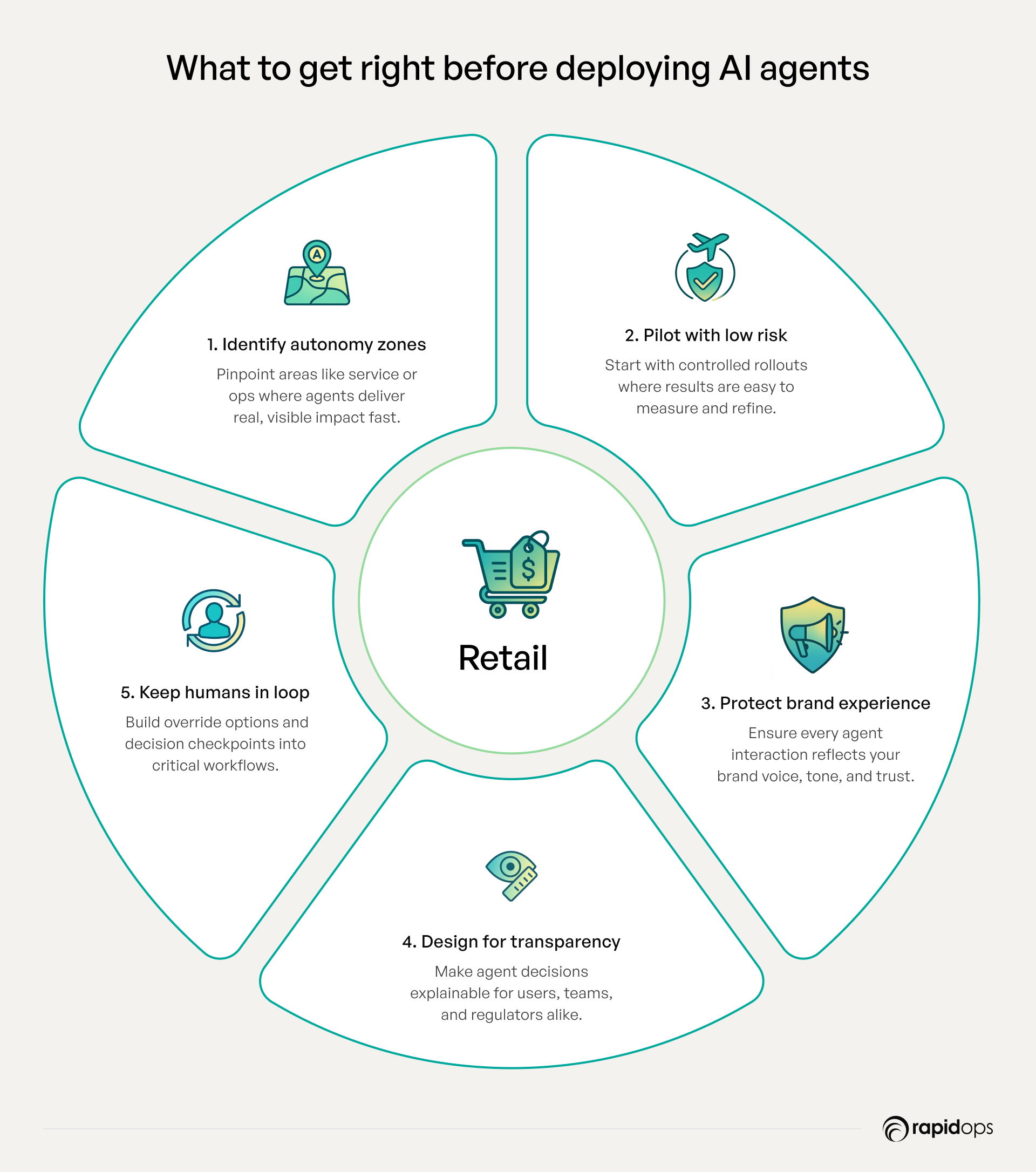
1. Identify high-impact autonomy zones
Not every retail task needs agentic automation. Focus on areas where autonomy delivers significant value without compromising control, like customer service for 24/7 support, logistics for real-time inventory, or merchandising for localized assortment. These zones involve data-rich, repetitive decisions where AI agents enhance speed, precision, and ROI from early deployments.
2. Launch low-risk, high-visibility pilots
Pilots are proving grounds. Start with workflows where outcomes are measurable, risk is low, and visibility is high, like automating FAQs or staff scheduling. These early wins build trust, identify friction points, and prepare teams to scale agent-based workflows with confidence.
3. Protect the brand across agent touchpoints
AI agents must extend, not dilute, your brand. Whether it's tone in chats or responsiveness across channels, every interaction matters. Train agents on brand values and emotional nuance so they deliver experiences that feel human, not robotic, thereby reinforcing trust rather than eroding it.
4. Design for transparency and explainability
As agents influence pricing, inventory, and customer journeys, transparency is non-negotiable. Teams must understand how decisions are made. Use interpretable models, document logic in business terms, and ensure decisions are traceable. This boosts stakeholder confidence and enables compliance.
5. Keep humans in the loop at key decision points
AI agents bring speed and scale, but critical retail decisions like fraud detection, promotions, or customer recovery need human oversight. Design governance where agents suggest, but people approve. This hybrid model balances efficiency with accountability and builds trust in agent-driven processes.
Don't think of deploying AI agents without knowing these key factors that drive success & prevent costly mistakes
Download Now
Future of retail with AI agents
As retail moves into its next decade, AI agents will become essential to executing operations with precision, speed, and adaptability, not replacing human strategy, but scaling its impact across the business. The future lies in embedding intelligent agents deep within retail workflows to make decisions, trigger actions, and self-correct based on real-time conditions. With the help of top AI agent companies, businesses will drive the next wave of transformation.
1. Autonomous stock-level agents prevent out-of-stock scenarios
Inventory agents will continuously monitor sell-through rates, local demand shifts, and real-time supply signals to anticipate low-stock risks. They’ll autonomously trigger restocking, reallocation, or supplier alerts, creating a system that anticipates and responds to disruptions before they reach the shelf.
2. Store ops agents trigger task assignments based on real-time signals
Future store operations won’t rely on static schedules or checklists. Agents will use live data from footfall, shelf sensors, and backroom systems to initiate staff tasks, whether that’s restocking a shelf or addressing a high-priority service request based on real-world urgency, not static rules.
3. Sentient customer agents design real-time micro-journeys across touchpoints
Instead of just recommending products, agents will learn customer preferences, emotional cues, and situational context to design personalized, end-to-end experiences. These agents will dynamically adjust engagement paths across online and in-store channels in real-time, without manual orchestration.
4. Merchandising agents monitor planogram compliance across stores
AI agents equipped with advanced computer vision will automatically scan shelves and displays to ensure that planograms are executed consistently across all locations. They’ll detect misplacements, trigger corrections, and surface insights for merchandising teams to optimize layouts faster than manual checks allow.
5. Vendor management agents surface performance anomalies
Future vendor relationships will be managed by agents that monitor delivery accuracy, cost fluctuations, and compliance. These agents will detect early signals of risk—like consistent delays or declining quality and recommend renegotiations, substitutions, or proactive resolutions before SLAs are breached.
6. Ops orchestration agents manage SLA-driven workflows
Cross-functional operations will be coordinated by AI agents that track SLAs in real time. From fulfillment to reverse logistics, these agents will dynamically route tasks, allocate resources, and escalate bottlenecks to maintain service levels across departments, without needing constant human oversight.
The age of intelligent retail has arrived
What you've just explored is more than a shift in technology; it's a fundamental rethinking of how modern retail operates. From reactive automation to real-time intelligence, from siloed systems to connected decision-making, AI agents are enabling a new kind of retail enterprise. One that doesn't just respond to change but anticipates and adapts with agility.
And the need has never been more urgent. Rising fulfillment demands, unpredictable customer behavior, and fragmented tools aren't future problems. They're today's bottlenecks. That's why retailers are moving beyond stopgap solutions. They're investing in AI agent ecosystems that bring intelligence to the core of their operations, empowering faster decisions, seamless experiences, and continuous optimization across the value chain.
At Rapidops, we help enterprise retail teams make that transformation real. We bring together strategy, systems, and AI agent expertise to architect intelligent operations that unlock measurable, lasting advantage. If you're ready to explore how this shift applies to your business, you can schedule a session with one of our retail intelligence experts and take the first step toward building what's next.
Frequently Asked Questions
What exactly makes an AI agent “intelligent” in a retail setting?
An AI agent is considered “intelligent” when it can autonomously perceive retail environments, process real-time data, learn from patterns, and make context-aware decisions. Unlike static automation, intelligent agents adapt dynamically, whether forecasting demand shifts, resolving stock issues, or personalizing offers. Their learning capabilities continuously evolve through data, making them proactive partners in driving retail efficiency, precision, and customer experience at scale.
How are AI agents changing the role of human employees in retail?
AI agents are augmenting human roles, not replacing them. By handling repetitive, data-heavy tasks like demand planning, inventory tracking, and customer support, they free employees to focus on value-adding responsibilities such as relationship building, creative merchandising, and decision-making. Retailers benefit from increased productivity, while employees gain tools that enhance efficiency, reduce burnout, and elevate strategic contributions across operations, marketing, and customer engagement.
Are AI agents capable of handling seasonal spikes or supply chain disruptions?
Yes. AI agents use real-time data, demand forecasting, and historical trends to detect seasonal patterns and potential disruptions early. They can trigger proactive inventory reallocations, optimize logistics, and coordinate dynamic pricing or replenishment strategies. During peak periods or crises, AI agents respond faster than manual systems, enabling retailers to maintain continuity, improve agility, and reduce losses from stockouts or overstocking.
Can smaller or mid-sized retailers also benefit from AI agents?
Absolutely. Modern AI agents are accessible through cloud-native platforms, removing the need for massive infrastructure. They can scale to fit the needs of small and mid-sized retailers, offering capabilities like automated customer service, smart inventory insights, and personalized marketing. With lower costs and faster time to value, AI agents empower smaller retailers to compete with enterprise players and deliver smarter, leaner operations.
Are AI agents helping create new business models in retail?
Yes. AI agents are enabling outcome-based, hyper-personalized, and data-driven business models. Retailers are leveraging agents to support “retail-as-a-service,” dynamic pricing engines, and AI-curated storefronts. By continuously learning from customer behavior, market shifts, and supply trends, these agents support innovation in subscriptions, same-day fulfillment, and predictive shopping, reshaping how value is delivered and how retail brands engage and monetize their audiences.
How do AI agents impact merchandising and assortment planning?
AI agents analyze customer preferences, local demand signals, inventory velocity, and sales performance to suggest optimal assortments and pricing. They help retailers localize strategies per region, reduce deadstock, and improve margins by dynamically adjusting mix and stock levels. This real-time, data-driven decision-making replaces guesswork, improving accuracy in merchandise planning and enabling faster adaptation to shifting customer demand or seasonal trends.
Can AI agents work with legacy retail systems and ERPs?
Yes. AI agents can integrate with legacy systems through APIs, middleware, or data pipelines. They act as intelligent layers that extract data, run advanced analytics, and deliver insights or actions back to traditional systems. This hybrid integration approach helps retailers modernize incrementally, without full system overhauls. AI agents can bring next-gen capabilities to ERPs, POS systems, and supply chain tools with minimal disruption.

Rahul Chaudhary
Content Writer
With 5 years of experience in AI, software, and digital transformation, I’m passionate about making complex concepts easy to understand and apply. I create content that speaks to business leaders, offering practical, data-driven solutions that help you tackle real challenges and make informed decisions that drive growth.
What’s Inside
- Understanding AI agents in the retail context
- Why the retail industry needs AI agents now
- The business value AI agents deliver to retailers
- High-impact use cases across the retail value chain
- What do you need in place to adopt AI agents successfully
- Key considerations before implementing AI agents in retail
- Future of retail with AI agents
- The age of intelligent retail has arrived

Let’s build the next big thing!
Share your ideas and vision with us to explore your digital opportunities
Similar Stories
- AI
- 4 Mins
- September 2022

- AI
- 9 Mins
- January 2023


Receive articles like this in your mailbox
Sign up to get weekly insights & inspiration in your inbox.

